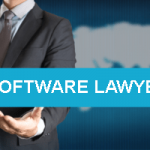 Whether you run a company that sells software or are an application developer, it’s important to get an experienced software lawyer to help you protect your intellectual property (IP).
Whether you run a company that sells software or are an application developer, it’s important to get an experienced software lawyer to help you protect your intellectual property (IP).
How does that work?
Your App Development Agreement
Have our software attorney review your software development agreement to ensure that it provides you what you need for your business. If you don’t have a contract, Attorney Mike Young can prepare one that’s designed to meet your needs.
Important Variations
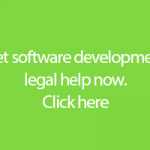 For example, will your developers be handling a single project or multiple software development projects on an ongoing basis?
For example, will your developers be handling a single project or multiple software development projects on an ongoing basis?
Of course, the structure of your software contract will be significantly different based on how you answer this question in order to ensure you’re protected when it comes to performance and potential liability if things go wrong.
Note that what’s included in your development agreement will also vary depending upon whether it’s a desktop application, mobile app, or software-as-a-service (SaaS).
The Myth of Standard App Development Contracts
Now you should never accept the other party’s contract at face value as “standard” for app development. For example, the “standard agreement” may not give you ownership of software intellectual property that you need.
Related Article: Software Development Agreement – 10 Issues to Cover
Are You A Software Developer?
 If you’re a developer, you want an agreement you can use repeatedly that’s written with particular language that lets you recycle code on other app development projects while limiting your liability risk exposure if the client is unhappy.
If you’re a developer, you want an agreement you can use repeatedly that’s written with particular language that lets you recycle code on other app development projects while limiting your liability risk exposure if the client is unhappy.
Do You Hire App Developers Or Outsource Projects To Them?
On the other hand, if you have software being developed by employees or independent contractors, you want to make sure you truly get what you pay for plus have legal remedies in case something goes wrong.
As you can see, there’s no one-size-fits all software development agreement because the needs of your business are unique whether you’re the developer or the company that’s paying for app development.
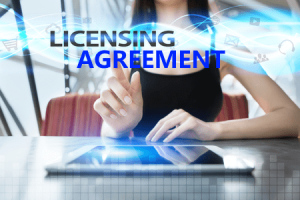 In addition to development, many software legal issues relate to licensing. In a nutshell, licensing is granting permission for an individual or business (as licensee) to use your software under certain terms and conditions.
In addition to development, many software legal issues relate to licensing. In a nutshell, licensing is granting permission for an individual or business (as licensee) to use your software under certain terms and conditions.
An experienced software attorney can identify which types of licenses you need for your application to protect your intellectual property.
Related Article: Protect Your Intellectual Property With The Right Software License Agreement
For example, a click-wrap license for a software as a service (SaaS) will contain different terms than a mobile app licensing agreement.
You will have a lot more freedom with the content of the former than the latter because mobile app licensing is somewhat restricted by the rules imposed by third party platforms such as Google Play for Android apps and Apple’s App Store if you want broad distribution of your mobile app.
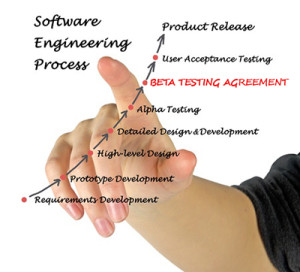 If you’re beta testing your application (and you should) before release, you’ll want a software lawyer to make it clear in a beta test contract the limited rights and responsibilities of those testing your software.
If you’re beta testing your application (and you should) before release, you’ll want a software lawyer to make it clear in a beta test contract the limited rights and responsibilities of those testing your software.
The scope of the app’s beta license granted will be more restrictive than the end user license agreement (EULA) that retail customers get upon release.
Related Article: What to Include in a Software Beta Testing Agreement
Software Lawyer Mike Young can draft the narrow terms you want to protect your IP at this important stage of development.
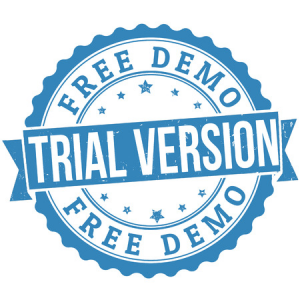 If you’re offering a limited version of your application or the full demo version for a trial period, you’ll want our software attorney to prepare a software evaluation license to restrict user rights until they purchase a EULA for the full version from you or one of your retailers.
If you’re offering a limited version of your application or the full demo version for a trial period, you’ll want our software attorney to prepare a software evaluation license to restrict user rights until they purchase a EULA for the full version from you or one of your retailers.
Related Article: How To Use A Software Evaluation Agreement
Note that a trial version software license will be different from a beta testing license. In addition, the terms and conditions of a demo license will vary somewhat depending upon whether use of the software is free during the trial period, whether there is an upgrade free from a limited version or continued use of a full version after a trial period has expired (e.g., 30 days), and a variety of related factors.
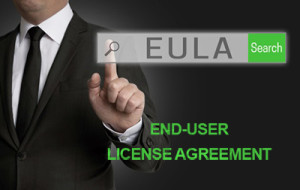 If you’re selling software or giving it away (e.g., freemium games), you’ll want a software lawyer to review your existing EULA to ensure your intellectual property rights are properly covered.
If you’re selling software or giving it away (e.g., freemium games), you’ll want a software lawyer to review your existing EULA to ensure your intellectual property rights are properly covered.
Related Article: EULA – 7 Key Parts of a Software End User License Agreement
One of the most important issues to cover in a EULA is the fact the license is permission granted only to an end user. This means making it clear to the user the EULA does not include any resale, private labeling, or other rights you might grant another party.
On the other hand the EULA can be modified to include app use on multiple devices (e.g. computer, smart phone, and tablet) by the licensee or even expanded to include more than one individual (e.g. a small business EULA that covers all employees within the company as end users).
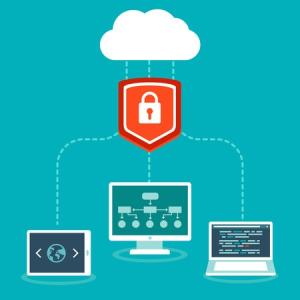 If you have limited resources, you may want to reach out to potential overseas joint venture partners to distribute your software internationally (and perhaps create foreign language versions of your application). For these transactions, you’ll want a seasoned software attorney to prepare the licensing terms in your international distribution contracts.
If you have limited resources, you may want to reach out to potential overseas joint venture partners to distribute your software internationally (and perhaps create foreign language versions of your application). For these transactions, you’ll want a seasoned software attorney to prepare the licensing terms in your international distribution contracts.
Related Article: 10 Keys to a Successful International Software Distribution Agreement
Otherwise, you may find your licensees cannibalizing your local market with grey market software, have piracy issues, or licensees selling your software but not paying you royalties you’re due.
One of the most important issues is dispute resolution. Where and how will disputes with a foreign licensee be resolved? What law will govern the dispute? Will you be going to court? Or using alternative dispute resolution such as mediation and arbitration. If arbitration, will it be binding on the parties or will you end up in court anyway?
 One of the most misunderstood software legal issues involves resale (often misspelled as “resell”) rights. Few software vendors or their licensees correctly handle these types of rights.
One of the most misunderstood software legal issues involves resale (often misspelled as “resell”) rights. Few software vendors or their licensees correctly handle these types of rights.
This means a resale licensee may mistakenly believe he has master resale rights. Even worse, some licensees will rename software under their own private label and sell copies to others while building a competing brand.
Fortunately, our software lawyer can help ensure that everyone’s on the same page as to who owns what when it comes to resale licenses. And the license should provide for appropriate legal remedies to protect your interests if a licensee decides to improperly sell or give copies of your software to others.
 You can search for the software lawyer you need in Google, Bing, another search engine, or an online legal directory and hope that you get lucky by finding one that’s right for you.
You can search for the software lawyer you need in Google, Bing, another search engine, or an online legal directory and hope that you get lucky by finding one that’s right for you.
However, if you’d like to speak with Attorney Young at our business law firm about protecting your application rights as owner or developer, you’ll want to set up a phone consultation with him.
Note that in addition to being a software attorney, he’s the co-owner of a law-related software company. This means he understands both the business and legal aspects of app development and protection.
